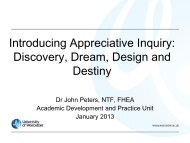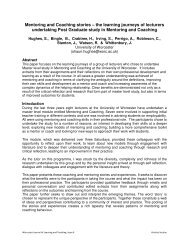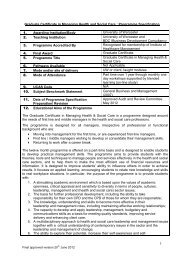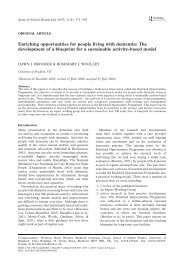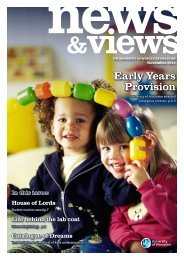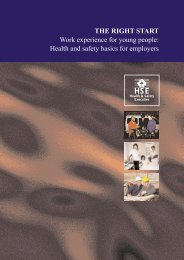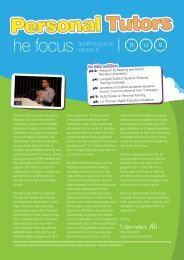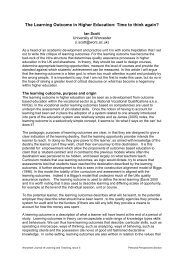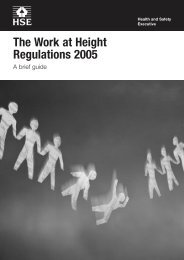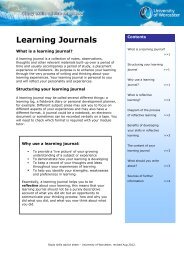BSc (Hons) Midwifery - University of Worcester
BSc (Hons) Midwifery - University of Worcester
BSc (Hons) Midwifery - University of Worcester
You also want an ePaper? Increase the reach of your titles
YUMPU automatically turns print PDFs into web optimized ePapers that Google loves.
Status: Confirmed version: 1<br />
SECTION 2: PROGRAMME SPECIFICATION<br />
The Programme Specification is a concise description <strong>of</strong> the learning opportunities<br />
provided by the course and an outline <strong>of</strong> the ways in which these opportunities can<br />
be achieved and demonstrated.<br />
1 Awarding institution/body <strong>University</strong> <strong>of</strong> <strong>Worcester</strong><br />
2 Teaching institution <strong>University</strong> <strong>University</strong> <strong>of</strong> <strong>Worcester</strong><br />
3 Programme accredited by Nursing and <strong>Midwifery</strong> Council<br />
4 Final award <strong>BSc</strong> (<strong>Hons</strong>) <strong>Midwifery</strong> (leading to<br />
Registration on the NMC Pr<strong>of</strong>essional<br />
Register)<br />
5 Programme title Bachelor <strong>of</strong> Science with Honours<br />
<strong>Midwifery</strong><br />
6 Pathways available Single<br />
7 Mode and site <strong>of</strong> delivery Taught Programme delivered at the<br />
<strong>University</strong> <strong>of</strong> <strong>Worcester</strong> and local NHS<br />
Trusts<br />
8 Mode <strong>of</strong> attendance Full Time<br />
9 UCAS Code B720-<strong>BSc</strong>/MID – WORCS – W80<br />
10 Subject Benchmark Statement <strong>Midwifery</strong><br />
Date <strong>of</strong> PS preparation/revision August 2011<br />
11. EDUCATIONAL AIMS OF THE PROGRAMME<br />
To facilitate the education <strong>of</strong> student midwives to enable them to:<br />
<br />
<br />
<br />
<br />
<br />
<br />
<br />
to achieve the <strong>Midwifery</strong> Pr<strong>of</strong>iciencies (NMC 2009) and become eligible to register<br />
on the midwifery section <strong>of</strong> the NMC Pr<strong>of</strong>essional Register.<br />
effectively integrate theory and practice.<br />
deliver a woman – centred, evidence based approach to care which encourages<br />
partnership between midwives, women and their families;<br />
become a flexible practitioner who can transfer and synthesise skills and<br />
knowledge to meet the demands <strong>of</strong> differing practice environments and who<br />
recognises both the accountability and responsibilities <strong>of</strong> the midwife’s role;<br />
become a reflective practitioner capable <strong>of</strong> clinical reasoning, decision making<br />
and sound pr<strong>of</strong>essional judgement.<br />
become a midwifery practitioner who is committed to lifelong learning and<br />
continuing pr<strong>of</strong>essional development.<br />
Promote ethical and non – discriminatory practices.<br />
The aims and objectives <strong>of</strong> the programme are designed to fully embrace the<br />
<strong>Midwifery</strong> Standards (NMC 2009) and to meet the standards required to achieve an<br />
Honours degree.<br />
12. INTENDED LEARNING OUTCOMES AND LEARNING, TEACHING AND<br />
ASSESSMENT METHODS<br />
This section has been written reflecting the recommendations <strong>of</strong> the <strong>University</strong> <strong>of</strong><br />
<strong>Worcester</strong>’s Learning Outcomes Policy:<br />
http://www2.worc.ac.uk/aqu/pdf/LearningOutcomesGuide2007finalversion.doc<br />
Created on: 2 August 2011<br />
Author: TD<br />
1
Status: Confirmed version: 1<br />
Intended Learning Outcomes<br />
On completion <strong>of</strong> the course students will have acquired the knowledge, skills,<br />
understanding and attitudes that will enable them to:<br />
1. demonstrate the ability to perform the activities <strong>of</strong> a midwife competently,<br />
efficiently and effectively<br />
2. achieve the standards for pre-registration midwifery education<br />
3. develop personal and pr<strong>of</strong>essional management and decision making skills;<br />
4. work as an effective team member, communicating appropriately with others<br />
within a variety <strong>of</strong> health care settings;<br />
5. critically appraise the role, responsibility and accountability <strong>of</strong> the midwife within<br />
the multidisciplinary team;<br />
6. develop an expertise in reflection, in order to promote higher levels <strong>of</strong> selfawareness<br />
in assessing personal and pr<strong>of</strong>essional growth and development;<br />
7. transfer and apply creative skills and exercise significant judgement in a range <strong>of</strong><br />
situations<br />
8. critically evaluate the role, responsibility and accountability <strong>of</strong> the midwife in<br />
creating a positive teaching and learning environment for women and their<br />
families;<br />
9. recognise the essential relationship between midwifery practice, theory and best<br />
available evidence and apply this in a range <strong>of</strong> situations;<br />
10. practice within a legal and ethical framework and appreciate the impact <strong>of</strong> legal<br />
and ethical issues on the student’s pr<strong>of</strong>essional role and in the delivery <strong>of</strong><br />
midwifery care;<br />
11. recognise the significance <strong>of</strong> midwifery supervision in providing pr<strong>of</strong>essional and<br />
personal support;<br />
12. critically evaluate new concepts and evidence from a wide range <strong>of</strong> sources<br />
13. critically review current political drivers that influence the provision <strong>of</strong> maternity<br />
services;<br />
14. demonstrate a positive attitude to self-directed life-long learning in order to<br />
promote quality and excellence.<br />
Transferable and graduate skills<br />
In addition to the subject specific knowledge and skills students will develop a range<br />
<strong>of</strong> transferable and graduate skills which are underpinned by <strong>University</strong> <strong>of</strong> <strong>Worcester</strong><br />
Student Qualities Pr<strong>of</strong>ile <strong>of</strong> personal learning, social, communication and practical<br />
learning skills.<br />
Grids illustrating how the programme learning outcomes and transferable skills are<br />
mapped against individual modules can be found in appendices 2 and 4.<br />
Learning, teaching and assessment strategy<br />
This section has been developed taking into account the recommendations <strong>of</strong> the<br />
<strong>University</strong> <strong>of</strong> <strong>Worcester</strong>’s Learning and Teaching Strategy and the Institute’s<br />
assessment and moderation policies:<br />
Created on: 2 August 2011<br />
Author: TD<br />
2
Status: Confirmed version: 1<br />
Learning, Teaching and Assessment Strategy<br />
The philosophy which drives this programme’s learning, teaching and assessment<br />
methods is firmly rooted in the belief that every student should be enabled to<br />
maximise their learning potential through a variety <strong>of</strong> stimulating inclusive learning<br />
and teaching opportunities. The programme seeks to fully integrate theory and<br />
practice therefore each module has been designed to reflect this integration.<br />
The course team seeks to provide an inclusive, supportive and flexible learning<br />
environment in which e-learning is integrated fully. The aim is to provide “blended<br />
learning” opportunities where students can enjoy and access a range <strong>of</strong> teaching and<br />
learning methods, which utilize both online and face -to -face activities successfully.<br />
All modules <strong>of</strong>fered in this programme include both formal, summative and an<br />
informal, formative assessment; this process is also mirrored in the assessment <strong>of</strong><br />
clinical practice.<br />
<strong>University</strong> based learning<br />
A variety <strong>of</strong> learning and teaching strategies will be employed affording the<br />
students the opportunity to progress from supported learning in the first year to<br />
independent learning in the third year and beyond. These include a combination<br />
<strong>of</strong> traditional approaches such as lead lectures, and skills workshops and active<br />
learner-centred approaches such as problem/scenario based learning, directed<br />
and independent study sessions and debates.<br />
Practical simulations are used in the delivery <strong>of</strong> many aspects <strong>of</strong> the programme.<br />
This method is particularly relevant when teaching clinical skills where students<br />
are exposed to practice situations in realistic clinical skills rooms within the<br />
<strong>University</strong>. This approach encourages students to engage with the reality <strong>of</strong><br />
potential clinical events facilitating the development <strong>of</strong> decision-making, critical<br />
thinking and communication skills. Students are required to sign a consent form<br />
upon commencement <strong>of</strong> the course agreeing to participate in practical simulations,<br />
video and audio recordings.<br />
Students are encouraged to develop the skills <strong>of</strong> autonomous, critical and<br />
analytical thinking with the overall aim <strong>of</strong> emerging as reflective, reflexive lifelong<br />
learners.<br />
Inter-pr<strong>of</strong>essional and Shared Learning (IPL)<br />
The curriculum planning team acknowledge the importance <strong>of</strong> <strong>of</strong>fering<br />
opportunities where learning can be shared with other pr<strong>of</strong>essional groups.<br />
The proposed strategy to increase opportunities for IPL includes increasing<br />
learning opportunities with students studying on the following courses:<br />
<br />
<br />
Pre-Hospital, Unscheduled & Emergency Care FdSc<br />
Diploma in Higher Education, Nursing (Child, Mental Health and Adult branches<br />
and Graduate Diploma students)<br />
Created on: 2 August 2011<br />
Author: TD<br />
3
Status: Confirmed version: 1<br />
Many opportunities exist for IPL within clinical practice placements. Student<br />
midwives will be expected to participate in:<br />
<br />
<br />
<br />
<br />
<br />
Peri-natal audit meetings.<br />
Caesarean section audit meetings.<br />
Staff development activities.<br />
Round table discussions, where appropriate.<br />
Ward rounds.<br />
Learning in Practice<br />
Students are supernumerary whilst in the clinical learning environment affording<br />
them the opportunity to observe, participate and consolidate their knowledge and<br />
skills as appropriate for the stage <strong>of</strong> the course that they are at. Supernumerary<br />
status means “in relation to a student that she/he shall not as part <strong>of</strong> her/his<br />
programme <strong>of</strong> education, be employed by any person or body under contract <strong>of</strong><br />
service to provide maternity care. Experiences should be educationally driven.”<br />
(NMC 2009)<br />
Practice placements normally occur in blocks punctuated by blocks <strong>of</strong> theory<br />
delivered at the <strong>University</strong>. This theory is normally related to the students’ practice<br />
learning environment and therefore practice and theory are mutually supportive.<br />
Each student is supported in practice and summatively assessed by a sign-<strong>of</strong>f<br />
mentor who is on the practice provider’s register <strong>of</strong> sign-<strong>of</strong>f mentors. All students<br />
will have a preliminary and end <strong>of</strong> placement interview, mid-semester progress<br />
review and end <strong>of</strong> semester summative interview. Please refer to mentor guide for<br />
further information.<br />
13 ASSESSMENT STRATEGY<br />
The assessment strategy is tw<strong>of</strong>old. Firstly it is designed to enable students to<br />
demonstrate their fitness for practice and purpose leading to the award <strong>of</strong><br />
Registered midwife. Secondly, academic achievement leading to the award <strong>of</strong> <strong>BSc</strong><br />
(<strong>Hons</strong>) <strong>Midwifery</strong>.<br />
All practice/portfolio assessments must be passed. All components <strong>of</strong> practice<br />
based assessment are non-compensatory.<br />
When there are 2 separate assessments <strong>of</strong> theory within a module there may be<br />
compensation between them.<br />
Purpose <strong>of</strong> Assessment<br />
To demonstrate that students complete the course with the necessary<br />
knowledge, skills and pr<strong>of</strong>essional approach to be a pr<strong>of</strong>icient midwife.<br />
To safeguard the academic standards <strong>of</strong> the course by encouraging the<br />
intellectual development <strong>of</strong> students to a level comparable to that <strong>of</strong> other <strong>BSc</strong><br />
<strong>Hons</strong> courses.<br />
Created on: 2 August 2011<br />
Author: TD<br />
4
Status: Confirmed version: 1<br />
To safeguard the pr<strong>of</strong>essional standards <strong>of</strong> the programme by encouraging the<br />
students to attain learning outcomes required for midwife registration;<br />
To safeguard the interests <strong>of</strong> students, the assessment strategy should:<br />
be administratively viable and readily understood by students and staff;<br />
not create an excessive assessment load or discriminate unfairly against any<br />
individual student or group <strong>of</strong> students;<br />
provide information on progress to individual students, tutors and examiners:<br />
ensure comparability <strong>of</strong> assessment for students who are working at different<br />
sites and who are being examined on the same assessment component.<br />
Summative Assessment <strong>of</strong> Theory<br />
Each module is subject to summative assessment. A single module attracts 15<br />
credits and a 4000-word equivalency assessment. A double module attracts 30<br />
credits and 8000-word equivalency.<br />
A variety <strong>of</strong> assessment methods will be used throughout the programme to<br />
assess students’ capabilities in a range <strong>of</strong> pr<strong>of</strong>essional and academic attributes.<br />
Assessment will include essays, seen and unseen exams, reflective case studies,<br />
poster presentations, web-based assessments and practical assessments.<br />
In line with <strong>University</strong> <strong>of</strong> <strong>Worcester</strong> Learning Outcomes Policy<br />
http://www2.worc.ac.uk/aqu/pdf/LearningOutcomesGuide2007finalversion.doc,<br />
each assessment relates specifically to the identified learning outcomes for each<br />
module, with all learning outcomes assessed. For each module, details <strong>of</strong> the<br />
assessment requirements, including the weighting <strong>of</strong> each assessment item and<br />
any requirement to pass each assessment item will be provided at the launch <strong>of</strong><br />
each semester. In addition, detailed specific marking criteria for the assignment<br />
will be provided to be utilised in conjunction with the URF Generic Marking<br />
Criteria.<br />
Students will be advised <strong>of</strong> submission dates at the commencement <strong>of</strong> each<br />
module, and effective and timely feedback will be provided to all students.<br />
The programmes’ assessment strategy has been considered holistically; a grid<br />
illustrating how the range <strong>of</strong> assessment methods at each level <strong>of</strong> the course<br />
match modules in the programme.<br />
Summative Assessment <strong>of</strong> Practice<br />
The students’ assessment <strong>of</strong> clinical practice will be facilitated through the<br />
development and grading <strong>of</strong> a practice portfolio.<br />
The summative portfolio assessment <strong>of</strong> clinical practice has 2 non-compensatory<br />
components that together generate the grade awarded for clinical practice:<br />
1) Achievement <strong>of</strong> the NMC Standards for pre-registration midwifery education<br />
and the assessment <strong>of</strong> the student’s pr<strong>of</strong>essional attributes. Essential skills<br />
clusters will be summatively assessed at the end <strong>of</strong> year one and at the end <strong>of</strong><br />
year three.<br />
Created on: 2 August 2011<br />
Author: TD<br />
5
Status: Confirmed version: 1<br />
2) The supporting evidence required to meet the learning outcomes and the NMC<br />
standards <strong>of</strong> the semester (see module descriptors).<br />
Summative assessment <strong>of</strong> practice takes place at the end <strong>of</strong> each semester, with<br />
the NMC pr<strong>of</strong>iciencies being awarded a pass or fail. A registered midwife who is on<br />
the practice provider’s current register <strong>of</strong> sign <strong>of</strong>f mentors, supports and assesses<br />
the students in collaboration with other midwives. The supporting evidence<br />
presented in the portfolio is assessed and graded by an academic member <strong>of</strong> staff.<br />
10% <strong>of</strong> all summative practice assessments will be moderated by the <strong>Midwifery</strong><br />
Practice Facilitator or an academic member <strong>of</strong> the course team.<br />
Whilst giving direct care in the practice setting at least 40% <strong>of</strong> a student’s time must<br />
be spent being supervised (directly or indirectly) by the sign-<strong>of</strong>f mentor.<br />
Placement providers should support sign-<strong>of</strong>f mentors through provision <strong>of</strong> the<br />
equivalent <strong>of</strong> one hours protected time per student each week. This facilitates time<br />
for the sign-<strong>of</strong>f mentor to reflect, <strong>of</strong>fer feedback and keep records <strong>of</strong> student<br />
achievement (NMC, 2008).<br />
All fails in practice will have the <strong>Midwifery</strong> Practice Facilitator or an academic<br />
member <strong>of</strong> staff present at the final interview.<br />
Thus students will be allowed a total <strong>of</strong> three attempts to pass the summative<br />
assessment <strong>of</strong> practice in any one semester. In line with NMC requirements (2009)<br />
the course must be completed within a 5 year period failure to do so will result in<br />
discontinuation from the <strong>BSc</strong> <strong>Midwifery</strong> programme.<br />
14 PROGRAMME STRUCTURE AND REQUIREMENTS<br />
This programme is for a three-year course; each year consists <strong>of</strong> two semesters<br />
within which a variety <strong>of</strong> modules <strong>of</strong> study will be <strong>of</strong>fered. The programme achieves<br />
the award <strong>of</strong> Bachelor <strong>of</strong> Science with Honours <strong>Midwifery</strong> and it is anticipated that all<br />
students will study on a full-time basis.<br />
The programme will meet all the relevant statutory requirements <strong>of</strong> the European<br />
Union Midwives Directives, the Subject Benchmark Statements (QAA, 2001) and<br />
Nursing and <strong>Midwifery</strong> Council (NMC) Standards for Pre-Registration <strong>Midwifery</strong><br />
Education (NMC 2009).<br />
This is a linear programme, which <strong>of</strong>fers no free or optional modules. Students will<br />
demonstrate their personal development planning within their portfolio.<br />
Each semester has four single modules or the equivalent. Each semester must be<br />
studied in sequence.<br />
The modules run concurrently in each semester and are summatively assessed.<br />
The total length <strong>of</strong> the programme <strong>of</strong>fered will be not less than three years (156<br />
weeks) full-time study. This equates to 4600 hours, 2300hrs in theory and 2300hrs<br />
Created on: 2 August 2011<br />
Author: TD<br />
6
Status: Confirmed version: 1<br />
in practice. The programme complies with NMC guidelines for a 156 week pre<br />
registration programme consisting <strong>of</strong> 50% theory and 50% practice (NMC, 2009).<br />
There is greater emphasis on theory in the first year <strong>of</strong> the course and less in the<br />
third year.<br />
Year <strong>of</strong> Course Theory Practice Total<br />
Year 1 922hrs (60%) 614hrs (40%) 1536hrs<br />
Year 2 768hrs (50%) 768hrs (50%) 1536hrs<br />
Year 3 614hrs (40%) 922hrs (60%) 1536hrs<br />
TOTAL OVERALL<br />
4608hrs<br />
This course attracts a maximum academic rating <strong>of</strong>:<br />
120 Credit Accumulation Transfer points (CATS) at Level 4<br />
120 CATS at Level 5<br />
120 CATS at Level 6 and eligibility for Pr<strong>of</strong>essional Registration<br />
Foundation Studies in <strong>Midwifery</strong> - Year 1<br />
Developmental Studies in <strong>Midwifery</strong> - Year 2<br />
Consolidation Studies in <strong>Midwifery</strong> – Year 3<br />
The course structure is longitudinal with the modules in each semester running<br />
concurrently as co-requisites and also acting as pre-requisites for all subsequent<br />
modules.<br />
Created on: 2 August 2011<br />
Author: TD<br />
7
Status: Confirmed version: 1<br />
<strong>BSc</strong> (<strong>Hons</strong>) MIDWIFERY COURSE STRUCTURE<br />
SEMESTER TITLE<br />
TAUGHT PRACTICE<br />
Year 1<br />
Semester 1<br />
Level 4 -<br />
60 Credits<br />
MIDW1001 – Knowledge for <strong>Midwifery</strong> Practice<br />
MIDW1003 – Physiological Basis <strong>of</strong> <strong>Midwifery</strong><br />
Practice (1)<br />
10 Weeks<br />
Community<br />
9 Weeks<br />
(30 hour week)<br />
Total: 9 weeks<br />
Year 1<br />
Semester 2<br />
Level 4 -<br />
60 Credits<br />
Year 2<br />
Semester 1<br />
Level 5 -<br />
60 Credits<br />
Year 2<br />
Semester 2<br />
Level 5 -<br />
60 Credits<br />
MIDW1009- Normal Birth<br />
MIDW1007- Physiological Basis <strong>of</strong> <strong>Midwifery</strong><br />
Practice (2)<br />
MIDW1011- Evidence Informed <strong>Midwifery</strong> (1)<br />
MIDW2001 - Therapeutic Relationships in <strong>Midwifery</strong><br />
Care<br />
MIDW2002 - Ethics in <strong>Midwifery</strong> Practice<br />
MIDW2003 – Surgical Interventions and Assisted<br />
Birth<br />
MIDW2009 - The High Risk Woman<br />
MIDW2011 - Evidence Informed <strong>Midwifery</strong> (2)<br />
MIDW2008 – Aspects <strong>of</strong> Neonatal Care<br />
9 Weeks<br />
8 Weeks<br />
7 Weeks<br />
9 wks<br />
(30 hour week)<br />
Labour Ward<br />
Total: 9 weeks<br />
Gynaecology<br />
Ward<br />
1 Week<br />
Labour Ward &<br />
Obstetric Theatre<br />
4 Weeks<br />
PN Ward<br />
5 Weeks<br />
Total: 10 weeks<br />
8 wks AN Ward /<br />
Clinic / DAU<br />
2 wks TCU/SCBU<br />
2 wks ITU/DHU<br />
Total: 12 weeks<br />
Year 3<br />
Semester 1<br />
Level 6 -<br />
45 Credits<br />
Year 3<br />
Semester 2<br />
Level 6 -<br />
75 Credits<br />
MIDW3001– Promoting Normality in <strong>Midwifery</strong><br />
Practice<br />
MIDW3003 – <strong>Midwifery</strong> in the 21 st Century<br />
MIDW3004 –Independent Study<br />
MIDW3006 – Preparation for midwifery practice<br />
MIDW3007 – The competent midwife practitioner<br />
6 Weeks<br />
4 Weeks<br />
Labour Ward/<br />
MLU<br />
4 Weeks<br />
Community<br />
8 Weeks<br />
Total: 12 weeks<br />
A.N/P.N wards<br />
2 Weeks<br />
Labour Ward<br />
10 Weeks<br />
Total: 12 weeks<br />
Created on: 2 August 2011<br />
Author: TD<br />
8
Status: Confirmed version: 1<br />
Student Progression<br />
The pr<strong>of</strong>essional nature <strong>of</strong> the programme necessitates end <strong>of</strong> semester<br />
progression points. At the end <strong>of</strong> each semester the midwifery examination<br />
board will convene to decide whether the students may:<br />
<br />
<br />
<br />
<br />
Receive an award:<br />
Progress to the next level<br />
Continue studying at the same level; or<br />
Be required to withdraw from the course<br />
The philosophy <strong>of</strong> student progression is dependent on the level <strong>of</strong> study.<br />
Level 4 students can expect to have structured support, progressing to a more<br />
independent status at level 6.<br />
14 QAA ACADEMIC INFRASTRUCTURE<br />
NMC (2009) Standards for Pre-Registration <strong>Midwifery</strong> Education<br />
The course meets the NMC requirements for: length, hours, theory/practice<br />
balance, student support and status, content and knowledge underpinning<br />
practice and range <strong>of</strong> practice learning experiences. By completion <strong>of</strong> the<br />
course students will have developed the theoretical knowledge, clinical<br />
pr<strong>of</strong>iciency; and personal and pr<strong>of</strong>essional attributes to achieve the NMC<br />
(2004) Standards for pre-registration <strong>Midwifery</strong> Education.<br />
QAA (2001) Benchmark Statements for <strong>Midwifery</strong><br />
These subject benchmark statements describe the nature and characteristics<br />
<strong>of</strong> programmes <strong>of</strong> study in <strong>Midwifery</strong> and provide support in the pursuit <strong>of</strong><br />
internal quality assurance.<br />
QAA (2001) Code <strong>of</strong> practice for the Assurance <strong>of</strong> Academic Quality and<br />
Standards in Higher Education: Placement Learning<br />
In accordance with NMC requirements, 50% <strong>of</strong> student learning is practicebased<br />
within the clinical environment. The programme adheres to the QAA<br />
Code <strong>of</strong> Practice For Placement Learning (QAA 2001).<br />
16 SUPPORT FOR STUDENTS<br />
Student support is considered to be a crucial component <strong>of</strong> the midwifery<br />
programme, as well as being key to maximising retention. A variety <strong>of</strong> support<br />
mechanisms are <strong>of</strong>fered to students before and during their studies in both the<br />
<strong>University</strong> and clinical learning environments. Examples include:<br />
<strong>Midwifery</strong> Taster Day<br />
The <strong>Midwifery</strong> Taster day (MTD) was introduced in December 2002 in<br />
response to meeting the needs <strong>of</strong> non-traditional applicants to the programme,<br />
i.e. those with little or no experience <strong>of</strong> clinical care, or who have not followed a<br />
traditional educational path. These, and indeed many other applicants to the<br />
Created on: 2 August 2011<br />
Author: TD<br />
9
Status: Confirmed version: 1<br />
<strong>Midwifery</strong> programme, are frequently naïve to the demands inherent within a<br />
rigorous course <strong>of</strong> study that <strong>of</strong>fers both an academic degree and a<br />
pr<strong>of</strong>essional qualification. The MTD therefore evolved as a means <strong>of</strong> providing<br />
not only information about the midwifery programme, but also a significant<br />
opportunity to engage with those already experiencing student midwifery. This<br />
unique initiative is consistently praised by the NMC as an example <strong>of</strong> good<br />
practice, and subsequently been adopted by other programmes, both within<br />
and external to the university. The MTD is held twice a year during the UCAS<br />
application cycle.<br />
Moving on Programme<br />
The Moving on Programme (MOP) works in harmony with the overall<br />
philosophy <strong>of</strong> the MTD. All new starters are invited to attend university for a<br />
pre-course introduction week, where they have the opportunity to engage with<br />
current course students, clinical mentors, and midwifery lecturers. The<br />
essential aim <strong>of</strong> the MOP is to foster early relationships with new students and<br />
therefore support their transition to the higher education environment. This<br />
initiative was introduced for the first time in 2011, funded by a Teaching &<br />
Learning award.<br />
17 ADMISSIONS POLICY, CRITERIA AND PROCEDURES<br />
Commissioning & Recruitment<br />
The commissioning body for the <strong>University</strong> <strong>of</strong> <strong>Worcester</strong> is The Strategic<br />
Health Authority: The NHS Midlands and East. Commissions are currently<br />
confirmed in March prior to the forthcoming September and February intakes.<br />
Criteria for Admission<br />
The admission requirements for the course are:<br />
Sept 2012 entry<br />
280 UCAS points, from a maximum <strong>of</strong> 3½ A levels.<br />
One must be a relevant subject, e.g. Health & Social Care, Psychology, a<br />
Science.<br />
5 GCSE passes, grade C or above, to include English, Science and Math’s.<br />
Evidence <strong>of</strong> recent academic study (within 5 years).<br />
OR<br />
Access Diploma. A total <strong>of</strong> 60 credits, 45 must be at level 3. 24 credits must<br />
be at merit/distinction level.<br />
OR<br />
BTEC National Diploma. Relevant named award preferred, e.g. Health &<br />
Social Care.<br />
AND<br />
Level 2 equivalent modules in English language, Math’s and Science.<br />
Evidence <strong>of</strong> recent academic study (within 5 years).<br />
Other level 3 (not vocational) qualifications may be acceptable.<br />
Created on: 2 August 2011<br />
Author: TD<br />
10
Status: Confirmed version: 1<br />
Key Information for Applicants<br />
Applications to the midwifery programme should be made via UCAS each<br />
year, between September and January.<br />
<strong>Midwifery</strong> is an over subscribed course and therefore applications received<br />
outside the UCAS cycle will not be accepted.<br />
Ensure that a relevant and appropriate reference is included with your<br />
application. This will usually be an academic reference.<br />
Ensure that your personal statement has a clear midwifery focus;<br />
demonstrates a broad understanding <strong>of</strong> the role <strong>of</strong> the midwife; is objective<br />
and well written.<br />
All candidates are encouraged to attend a university open day or midwifery<br />
taster day.<br />
Admission Procedure<br />
Potential candidates are <strong>of</strong>fered pre application advice. When considering a<br />
career in midwifery, it may be helpful to consider the following person<br />
specification in order to help determine whether the individual possess the<br />
appropriate experience and qualities that are deemed essential for admission<br />
to the course. Individual applicants must:<br />
Meet academic entry criteria and be able to provide evidence <strong>of</strong> recent<br />
study.<br />
Have literacy and numeric skills.<br />
Demonstrate effective communication and interpersonal skills.<br />
Show interest and commitment to the pr<strong>of</strong>ession as demonstrated by your<br />
preparation for selection. You should have some familiarity with current<br />
topical pr<strong>of</strong>essional issues.<br />
Be adaptable, flexible, and prepared to work shift hours expected in clinical<br />
practice. These include night duty, weekends & bank holidays<br />
Be able to provide evidence <strong>of</strong> responsibility, trustworthiness, reliability and<br />
integrity.<br />
Have self-awareness, and an ability to identify personal<br />
strengths/weaknesses.<br />
Have the ability to cope with difficult circumstances.<br />
Have the ability to work within a team and independently.<br />
Have an appreciation <strong>of</strong> issues surrounding equal opportunities.<br />
Students are expected to travel to clinical placements in hospital and<br />
community settings therefore, whilst not essential, it is deemed desirable that<br />
those considering applying for this programme <strong>of</strong> study hold a current UK<br />
driving licence.<br />
The <strong>Midwifery</strong> Course Team supports the UW Equal Opportunity Policy and<br />
considers that the <strong>Midwifery</strong> Pr<strong>of</strong>ession should reflect the community that it<br />
serves. However, it is recognised that UW are responsible for ensuring that,<br />
before accepting applicants for entry to the education programme, the<br />
applicant is in good health and not knowingly suffering from any disability<br />
which might preclude meeting the requirements <strong>of</strong> the programme <strong>of</strong> education<br />
Created on: 2 August 2011<br />
Author: TD<br />
11
Status: Confirmed version: 1<br />
and subsequently carrying out the duties <strong>of</strong> a midwife. Admission is therefore<br />
conditional upon a satisfactory occupational health check and enhanced police<br />
clearance.<br />
All potential candidates have a contact name for either telephone enquiries or<br />
informal visits. The selection day team includes midwifery lecturers, clinical<br />
staff, and senior student midwives. During the day, candidates are provided<br />
with an overview <strong>of</strong> the course, as well as information about progression,<br />
bursary, and accommodation. Time is built in for candidates to ask any specific<br />
questions.<br />
The selection day involves the participation <strong>of</strong> candidates in a variety <strong>of</strong><br />
activities that demonstrate motivation, communication skills, numeric ability,<br />
team working skills, and literacy ability. On the day, successful applicants will:<br />
Articulate clearly and objectively their motivation to become a midwife.<br />
Demonstrate some contemporary knowledge and understanding <strong>of</strong><br />
midwifery practice and issues affecting women’s health.<br />
Communicate clearly, sensitively and with confidence.<br />
Achieve a minimum required standard in a numeracy test relevant to clinical<br />
practice.<br />
Engage with problem solving in a small team and be able to feedback their<br />
findings.<br />
Demonstrate their potential to be reflective and write at undergraduate level.<br />
The interviewers are also looking for evidence <strong>of</strong>:<br />
Organisation <strong>of</strong> small group task<br />
Appropriate contribution to the discussion<br />
Respecting others opinions<br />
Actively listening to others<br />
Effective use <strong>of</strong> non-verbal skills<br />
Ability to articulate their own view/argument<br />
Potential candidates are required to write up this activity in the form <strong>of</strong> a<br />
summary, therefore their ability to construct a summary, with a clear and<br />
logical progression <strong>of</strong> ideas and a reasonable conclusion will also be<br />
assessed.<br />
This along with performance at a formal interview is used to form a decision<br />
about a candidates potential for the course. Successful candidates who are<br />
recruited have to satisfy specific selection criteria, which are fully documented.<br />
Upon successful completion <strong>of</strong> all theory and practice based assessments an<br />
additional element <strong>of</strong> Declaration <strong>of</strong> Good Character is required to be<br />
completed by the lead midwife for education for each student before an<br />
application for registration with the NMC can be made at the end <strong>of</strong> the course.<br />
Created on: 2 August 2011<br />
Author: TD<br />
12
Status: Confirmed version: 1<br />
18 METHODS FOR EVALUATING AND IMPROVING THE QUALITY AND<br />
STANDARDS OF TEACHING AND LEARNING<br />
<br />
<br />
<br />
<br />
<br />
<br />
<br />
<br />
<br />
<br />
<br />
<br />
<br />
<br />
Formal review against the pre-registration NHS contractual requirements<br />
External examiner from the appropriate part <strong>of</strong> the NMC register<br />
Annual review <strong>of</strong> the quality <strong>of</strong> the course and External Examiner<br />
requirements<br />
Reviews undertaken by the Nursing and <strong>Midwifery</strong> Council<br />
Module/Semester evaluation by students and teaching staff<br />
Student representation upon relevant committees<br />
Review <strong>of</strong> operation/programme delivery by Course Committee<br />
Clinical staff representative involvement in student selection and identified<br />
course committees<br />
Maintenance <strong>of</strong> Mentor register<br />
Clinical learning environment audit<br />
Peer review <strong>of</strong> teaching<br />
<strong>University</strong> Learning and Teaching Committee and the Learning and<br />
Teaching Centre promotes Learning and Teaching across the institution<br />
A teacher-accredited course (SEDA) for new staff and promotion <strong>of</strong><br />
membership to the Higher Education Academy<br />
NMC Monitoring<br />
20 REGULATION OF ASSESSMENT<br />
Requirements to pass modules<br />
Modules are assessed using a variety <strong>of</strong> assessment activities which are<br />
detailed in the module specifications.<br />
The minimum pass mark is D- for each module.<br />
Students are required to submit all items <strong>of</strong> assessment in order to pass a<br />
module, and in some modules, a pass mark in each item <strong>of</strong> assessment<br />
may be required.<br />
Some modules have attendance requirements<br />
Full details <strong>of</strong> the assessment requirements for a module, including the<br />
assessment criteria, are published in the module outline.<br />
Submission <strong>of</strong> assessment items<br />
Students who submit course work late but within 5 days <strong>of</strong> the due date will<br />
have work marked, but the grade will be capped at D- unless an application<br />
for mitigating circumstances is accepted.<br />
Students who submit work later than 5 days but within 14 days <strong>of</strong> the due<br />
date will not have work marked unless they have submitted a valid claim <strong>of</strong><br />
mitigating circumstances.<br />
Students who fail to submit an item <strong>of</strong> assessment lose their right to<br />
reassessment in that module, and will be required to retake the module.<br />
For full details <strong>of</strong> submission regulations see URF.<br />
Created on: 2 August 2011<br />
Author: TD<br />
13
Status: Confirmed version: 1<br />
Retrieval <strong>of</strong> failure<br />
Students are entitled to resit failed assessment items for any module that is<br />
awarded a fail grade, unless the failure was due to non-attendance or nonsubmission.<br />
Reassessment items that are passed are graded at D-.<br />
If a student is unsuccessful in the reassessment, they have the right to<br />
retake the module.<br />
Requirements for Progression<br />
Students at Level 4 may be permitted to progress to Level 5 when they have<br />
passed at least 90 credits at Level 4.<br />
Students at Level 5 may be permitted to progress to Level 6 when they have<br />
passed at least 90 credits at Level 5.<br />
A student who fails 90 credits or more due to non-submission will be<br />
required to withdraw from the <strong>University</strong>.<br />
Students who pass less that 90 credits but have submitted all items <strong>of</strong><br />
assessment will be required to retake modules.<br />
Requirements for Awards<br />
Award<br />
Requirement<br />
CertHE<br />
Passed 120 credits at Level 4 or higher<br />
DipHE Passed a minimum <strong>of</strong> 240 credits with at least 105<br />
credits at Level 5 or higher<br />
Degree (nonhonours)<br />
credits at Level 5 or higher and a minimum <strong>of</strong><br />
Passed a minimum <strong>of</strong> 300 credits with at least 105<br />
60<br />
Degree with<br />
honours<br />
Classification<br />
credits at Level 6<br />
Passed a minimum <strong>of</strong> 360 credits with at least 105<br />
credits at Level 5 or higher and a minimum <strong>of</strong> 120<br />
credits at Level 6<br />
The honours classification will be determined by whichever <strong>of</strong> the following two<br />
methods results in the higher classification:<br />
classification determined on the pr<strong>of</strong>ile <strong>of</strong> the best 3 module (45 credits)<br />
grades attained at Level 5 and the best 8 module (120 credits) at Level 6 or<br />
classification determined on the best 8 module (120 credits) grades attained<br />
at Level 6 only<br />
The Board <strong>of</strong> Examiners considers students’ mark pr<strong>of</strong>iles to make decisions<br />
about progression, awards and degree classifications as appropriate.<br />
21 INDICATORS OF QUALITY AND STANDARDS<br />
The <strong>University</strong> underwent a QAA Institutional Audit in March 2011. The audit<br />
confirmed that confidence can be placed in the soundness <strong>of</strong> the institution’s<br />
current and likely future management <strong>of</strong> the academic standards <strong>of</strong> its<br />
Created on: 2 August 2011<br />
Author: TD<br />
14
Status: Confirmed version: 1<br />
awards and the quality <strong>of</strong> the learning opportunities available to<br />
students. The audit team highlighted several aspects <strong>of</strong> good practice,<br />
including the student academic representative (StARs) initiative, the<br />
proactive approach which supports the student experience for disabled<br />
students, the comprehensiveness <strong>of</strong> the student online environment (SOLE),<br />
the wide range <strong>of</strong> opportunities afforded to students to enhance their<br />
employability, the institution’s commitment to enhancement, and the inclusive<br />
approach to working with its collaborative partners.<br />
22 CAREER OPPORTUNITIES & LINKS WITH EMPLOYERS<br />
Students may progress to undertake further postgraduate study and/or<br />
clinically focused development.<br />
Achievement <strong>of</strong> the <strong>BSc</strong> (<strong>Hons</strong>) <strong>Midwifery</strong> and associated pr<strong>of</strong>essional<br />
registration will also facilitate employment in either the NHS or private health<br />
care sector as a Registered Midwife or Independent Practice.<br />
Please note: This specification provides a concise summary <strong>of</strong> the main<br />
features <strong>of</strong> the programme and the learning outcomes that a typical student<br />
might reasonably be expected to achieve and demonstrate if s/he takes full<br />
advantage <strong>of</strong> the learning opportunities that are provided. More detailed<br />
information on the learning outcomes, content and teaching, learning and<br />
assessment methods <strong>of</strong> each module can be found in the module study<br />
guide and course handbook. The accuracy <strong>of</strong> the information contained in<br />
this document is reviewed by the <strong>University</strong> and may be checked by the<br />
Quality Assurance Agency for Higher Education.<br />
Created on: 2 August 2011<br />
Author: TD<br />
15



